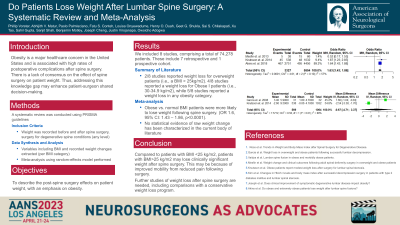Do Patients Lose Weight After Lumbar Spine Surgery: A Systematic Review and Meta-Analysis
Do Patients Lose Weight After Lumbar Spine Surgery: A Systematic Review and Meta-analysis
Friday, April 21, 2023


Phillip Vorster, BS
Medical Student
University of Cincinnati College of Medicine
Cincinnati, Ohio, United States
ePoster Presenter(s)
Introduction: Obesity is a major healthcare concern in the United States and is associated with high rates of postoperative complications after spine surgery. Obese patients assert that weight reduction is not possible unless spine surgery first relieves their pain and concomitant immobility. However, there is sparse evidence to suggest patients lose weight after spine surgery. Our objective is to determine and describe the post-spine surgery effects on patient weight, with an emphasis on obesity.
Methods: PubMed, EMBASE, Scopus, Web of Science, and Cochrane databases were systematically searched according to PRISMA guidelines. The search included indexed terms and text words from database inception to the date of the search (April 15th, 2022). Studies chosen for inclusion required data reporting on pre-operative and post-operative patient weight after spine surgery. Data and estimates were pooled using the Mantel-Haenszel method for random-effects meta-analysis.
Results: A total of 8 manuscripts encompassing 7 retrospective and 1 prospective cohort were identified. A random effects model analysis demonstrated that overweight and obese patients (BMI>25 kg/m2) had increased odds of clinically significant weight loss after lumbar spine surgery when compared to non-obese patients (OR 1.63, 95% CI: 1.43-1.86, p< 0.0001). There was no significant difference in “raw” weight change between BMI categories (Mean Difference -0.67kg, 95% CI -4.71kg – 3.37kg, p=0.7463). When combining all BMI categories, most prior studies demonstrated that patient weight is most likely to remain stable after spine surgery.
Conclusion : Compared to non-obese patients (BMI < 25 kg/m2), overweight and obese patients have higher odds of clinically significant weight loss after lumbar spine surgery. These results suggest that surgical treatment of lumbar pathology may help overweight and obese patients lose weight. Further studies are needed to compare this effect with medical management alone.
Methods: PubMed, EMBASE, Scopus, Web of Science, and Cochrane databases were systematically searched according to PRISMA guidelines. The search included indexed terms and text words from database inception to the date of the search (April 15th, 2022). Studies chosen for inclusion required data reporting on pre-operative and post-operative patient weight after spine surgery. Data and estimates were pooled using the Mantel-Haenszel method for random-effects meta-analysis.
Results: A total of 8 manuscripts encompassing 7 retrospective and 1 prospective cohort were identified. A random effects model analysis demonstrated that overweight and obese patients (BMI>25 kg/m2) had increased odds of clinically significant weight loss after lumbar spine surgery when compared to non-obese patients (OR 1.63, 95% CI: 1.43-1.86, p< 0.0001). There was no significant difference in “raw” weight change between BMI categories (Mean Difference -0.67kg, 95% CI -4.71kg – 3.37kg, p=0.7463). When combining all BMI categories, most prior studies demonstrated that patient weight is most likely to remain stable after spine surgery.
Conclusion : Compared to non-obese patients (BMI < 25 kg/m2), overweight and obese patients have higher odds of clinically significant weight loss after lumbar spine surgery. These results suggest that surgical treatment of lumbar pathology may help overweight and obese patients lose weight. Further studies are needed to compare this effect with medical management alone.
